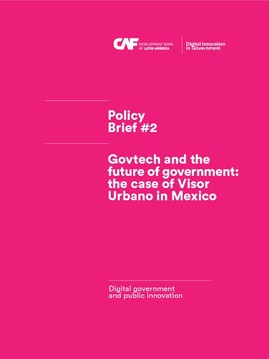| dc.contributor.author | Rivero del Paso, Lorena | |
| dc.coverage.spatial | América Latina y el Caribe | es_ES |
| dc.coverage.spatial | México | es_ES |
| dc.date.accessioned | 2020-03-06T12:32:29Z | |
| dc.date.available | 2020-03-06T12:32:29Z | |
| dc.date.issued | 2020-03-06 | |
| dc.identifier.citation | Rivero del Paso, L. (2019). Govtech and the future of government: the case of Visor Urbano in Mexico. (Visor Urbano, trad.). Caracas: CAF. Retrieved from https://scioteca.caf.com/handle/123456789/1532 | es_ES |
| dc.identifier.uri | https://scioteca.caf.com/handle/123456789/1532 | |
| dc.description.tableofcontents | How should government adopt and implement digital innovation to support a deep, cost-effective digital transformation that impacts the quality of goods and services delivered to the population? To answer that question is the objective of this article, which is based on the study: Govtech and the future of government: the Case of Visor Urbano in Mexico developed by Lorena Rivero del Paso, published originally in Spanish. | es_ES |
| dc.language.iso | en | es_ES |
| dc.publisher | CAF | es_ES |
| dc.subject | Evaluación de impacto | es_ES |
| dc.subject | Políticas públicas | es_ES |
| dc.subject | Sector público | es_ES |
| dc.subject | Tecnologías de la información y comunicación (TIC) | es_ES |
| dc.subject | govtech | |
| dc.subject | Transformación digital del Estado | |
| dc.title | Govtech and the future of government: the case of Visor Urbano in Mexico | es_ES |
| dc.title.alternative | Policy Brief #2 | es_ES |
| dc.type | Book | es_ES |
| dc.publisher.city | Caracas | es_ES |
| caf.relation.languageVersion | 123456789/1485 | es |



